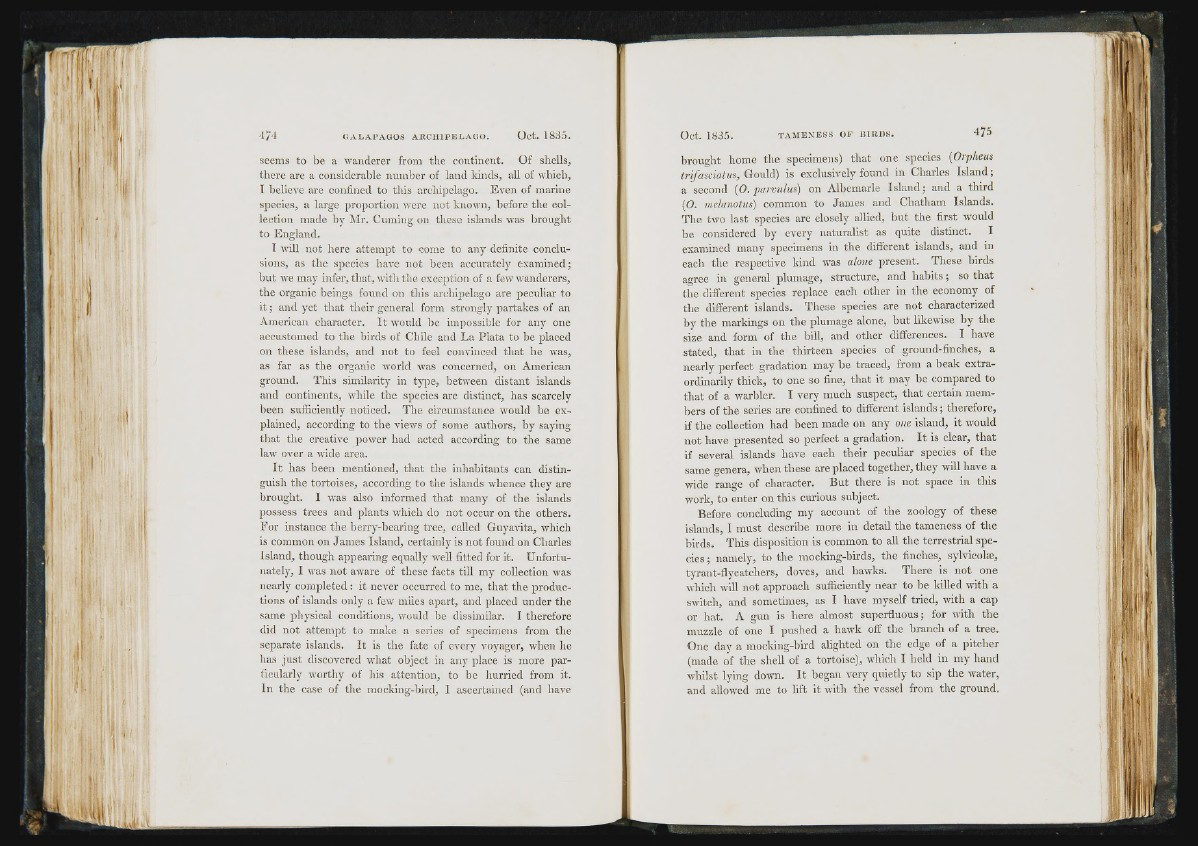
rit
seems to be a wanderer from the continent. Of shells,
there are a considerable number of land kinds, all of which,
I believe are confined to this archipelago. Even of marine
species, a large proportion were not known, before the collection
made by Mr. Cuming on these islands was brought
to England.
I will not here attempt to come to any definite conclusions,
as the species have not been accurately examined;
but we may infer, that, with the exception of a few wanderers,
the organic beings found on this archipelago are peculiar to
i t ; and yet that their general form strongly partakes of an
American character. It would be impossible for any one
accustomed to the birds of Chile and La Plata to be placed
on these islands, and not to feel convinced that he was,
as far as the organic world was concerned, on American
ground. This similarity in type, between distant islands
and continents, while the species are distinct, has scarcely
been sufficiently noticed. The circumstance would be explained,
according to the views of some authors, hy saying
that the creative power had acted according to the same
law over a wide area.
I t has been mentioned, that the inhabitants can distinguish
the tortoises, according to the islands whence they are
brought. I was also informed that many of the islands
possess trees and plants which do not occur on the others.
For instance the berry-bearing tree, called Guyavita, which
is common on James Island, certainly is not found on Charles
Island, though appearing equally well fitted for it. Unfortunately,
I was not aware of these facts till my collection was
nearly completed : it never occurred to me, that the productions
of islands only a few miles apart, and placed under the
same physical conditions, would be dissimilar. I therefore
did not attempt to make a series of specimens from the
separate islands. It is the fate of every voyager, when he
has just discovered what object in any place is more jiar-
ticularly worthy of his attention, to be hurried from it.
In the case of the mocking-bird, I ascertained (and have
brought home the specimens) that one species {Orpheus
trifasdatus, Gould) is exclusively found in Charles Island ;
a second {O. parvulus) on Albemarle Island; and a third
(O. melanotus) common to James and Chatham Islands.
The two last species are closely allied, but the first would
be considered by every naturalist as quite distmct. I
examined many specimens in the different islands, and in
each the respective kind was alone present. These birds
agree in general plumage, structure, and habits ; so that
the different species replace each other in the economy of
the different islands. These species are not characterized
by the markings on the plumage alone, but likewise by the
size and form of the bill, and other differences. I have
stated, that in the thirteen species of ground-finches, a
nearly perfect gradation may be traced, from a beak extraordinarily
thick, to one so fine, that it may he compared to
that of a warbler. I very much suspect, that certain members
of the series are confined to different islands ; therefore,
if the collection had been made on any one island, it would
not have presented so perfect a gradation. I t is clear, that
if several islands have each their pecuhar species of the
same genera, when these are placed together, they will have a
wide range of character. But there is not space in this
work, to enter on this curious subject.
Before concluding my account of the zoology of these
islands, I must describe more in detail the tameness of the
birds. This disposition is common to all the terrestrial species
; namely, to the mocking-birds, the finches, sylvicolæ,
tyrant-flycatchers, doves, and hawks. There is not one
which will not approach sufficiently near to be killed with a
switch, and sometimes, as I have myself tried, with a cap
or hat. A gun is here almost superfluous; for with the
muzzle of one I pushed a hawk off the branch of a tree.
One day a mocking-bird alighted on the edge of a pitcher
(made of the shell of a tortoise), which I held in my hand
whilst lying down. It began very quietly to sip the water,
and allowed me to lift it with the vessel from the ground.